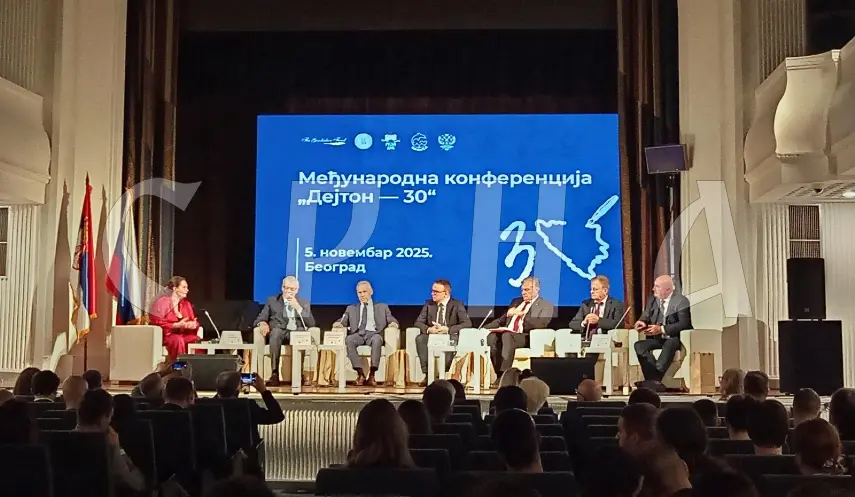KARAN: SOME HAVE BEEN UNDERMINING BiH'S STATE STRUCTURE FOR 30 YEARS
Serbia - "Dayton 30"
11/05/2025
19:45

BELGRADE, NOVEMBER 5 /SRNA/ - The Minister of Scientific and Technological Development and Higher Education of Republika Srpska, Siniša Karan, said in Belgrade that 30 years after the signing of the Dayton Agreement, some have been undermining the state structure and the pillars on which it rests, moving toward unitarization.
“They are moving toward a unitary state in which only the majority people would be dominant, and we, as numerically smaller peoples, would, once we lose our state-legal capacity, enter a process of gradual marginalization and being outvoted. It was precisely this outvoting and marginalization that led to the tragic conflict in 1992,” Karan emphasized.
Speaking to reporters ahead of a gathering at the Russian House in Belgrade on the occasion of the 30th anniversary of the Dayton Agreement, he said that in all other forums, the focus should be on explaining how the Dayton structure and system have been undermined, primarily by the High Representatives, who issued 913 decisions and imposed 166 laws that stripped competencies from Republika Srpska.
Karan emphasized that the constitutions of the entities have been amended 122 times, with the High Representative intervening five times with 35 amendments, and that the essence of all this was precisely the process of unitarization.
“All our resistance has been aimed at maintaining the strong Dayton constitutional and state-legal position of the Serb people and the entity of Republika Srpska as a federal unit,” he said.
When asked whether BiH can survive without Dayton, Karan said that in multi-ethnic states like BiH, the only possible state system is a federal one.
Karan has warned that attempts are being made to establish domination as a relationship between the peoples, but that such domination cannot succeed here.
“I do not want to imagine what would happen if those strong pillars of the federal state, which they are trying to destroy, were to collapse,” Karan said.
He emphasized that it is important for everyone, including brotherly Russia, to recognize the causes of what has been happening with the Dayton Agreement over the past 30 years.
“I believe that Schmidt’s latest intervention, who is essentially a nobody, and the actions of the regular and Constitutional Court, unfortunately the very court that is supposed to protect the Constitution of BiH and this state system, have completely opened our eyes and exposed all those who are undermining this constitutional order of BiH and the equality of the peoples,” he said.
Speaking about the Dayton Agreement, he said that it is a treaty that, very unusually, established the constitution of a newly created BiH, and that the main and central question for all countries in the world is how to organize a state.
“This system was determined by the fact that there were three dominant peoples in BiH, each of whom had their own specific state-legal and constitutional-legal goals. No one fully achieved all of their objectives,” he said, adding that the Dayton Peace Agreement provided the entities with full state-legal capacity.
He noted that, for the sake of peace and other interests, it is now necessary to find a common denominator for living together.
Karan said that BiH was created through a system of union and aggregation, which Republika Srpska has been protecting for 30 years, while others have been undermining it.
He emphasized that all federal states worldwide share three essential pillars: a clear division of competencies, equality, and consensus.
He noted that no federal state in the world that has interfered with this key area of division of competencies has survived.
“The second principle is that all institutions at the level of a joint federal state were created based on parity. This means that each holder of sovereignty, here, the three constituent peoples and the two entities, must have parity in the institutions of government: legislative, executive, and all others,” Karan added.
Speaking about consensus as the third key principle, he said that no decision, as recognized by the Constitution, can be made by outvoting any of the peoples.
“And here we have protections in the Parliamentary Assembly of BiH, entity-level protection in the House of Peoples, and vital interest protection in the Presidency,” Karan said.

DODIK: I EXPECT SUPERVISORY BOARD OF RiTE UGLJEVIK TO DISMISS MANAGEMENT OVERNIGHT AND APPOINT A NEW ONE

KARAN: SOME HAVE BEEN UNDERMINING BiH'S STATE STRUCTURE FOR 30 YEARS

VRANJEŠ: IF DIALOGUE IS NOT QUICKLY ESTABLISHED, NOTHING WILL REMAIN OF BiH

LJUBOJEVIĆ: DAYTON AGREEMENT HAS BEEN UNDERMINED; SRPSKA IS FIGHTING FOR PEACE AND ITS INSTITUTIONS


